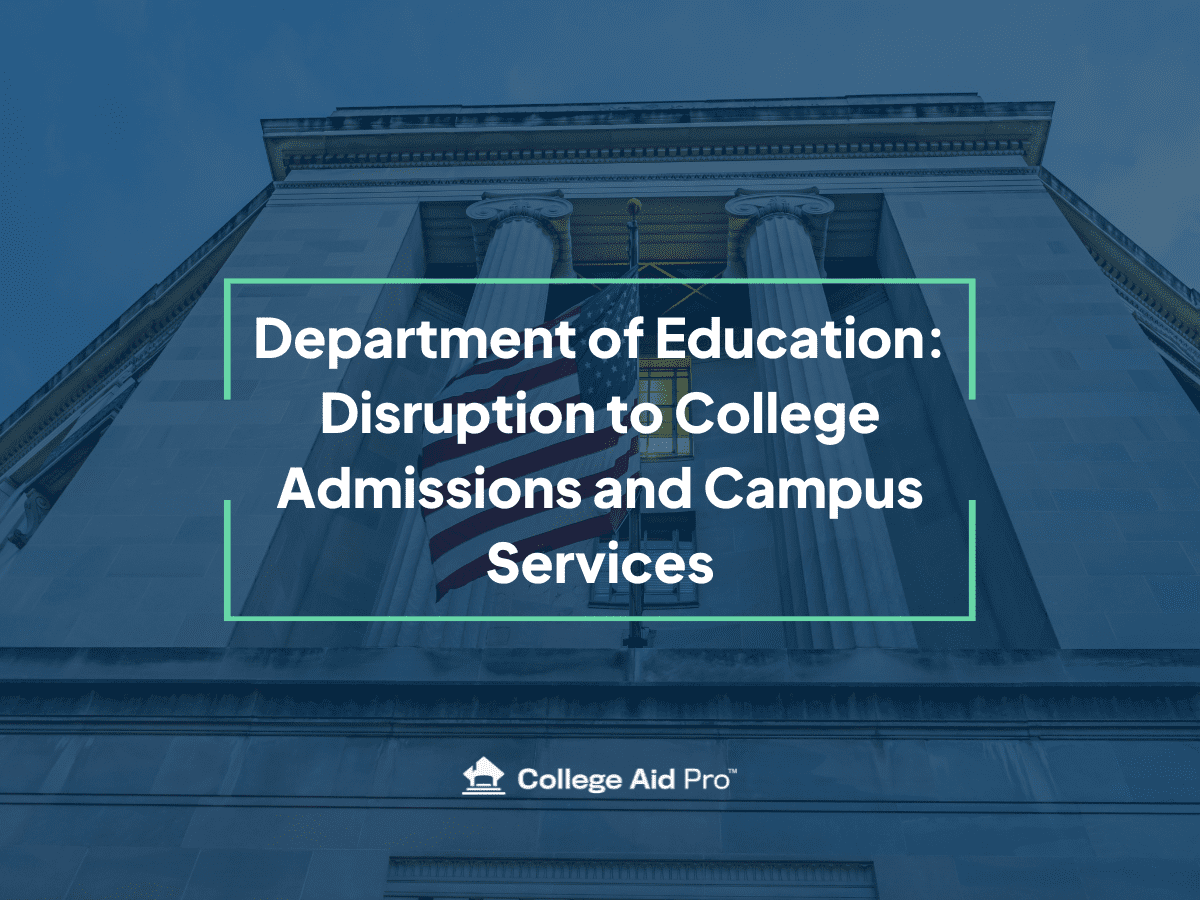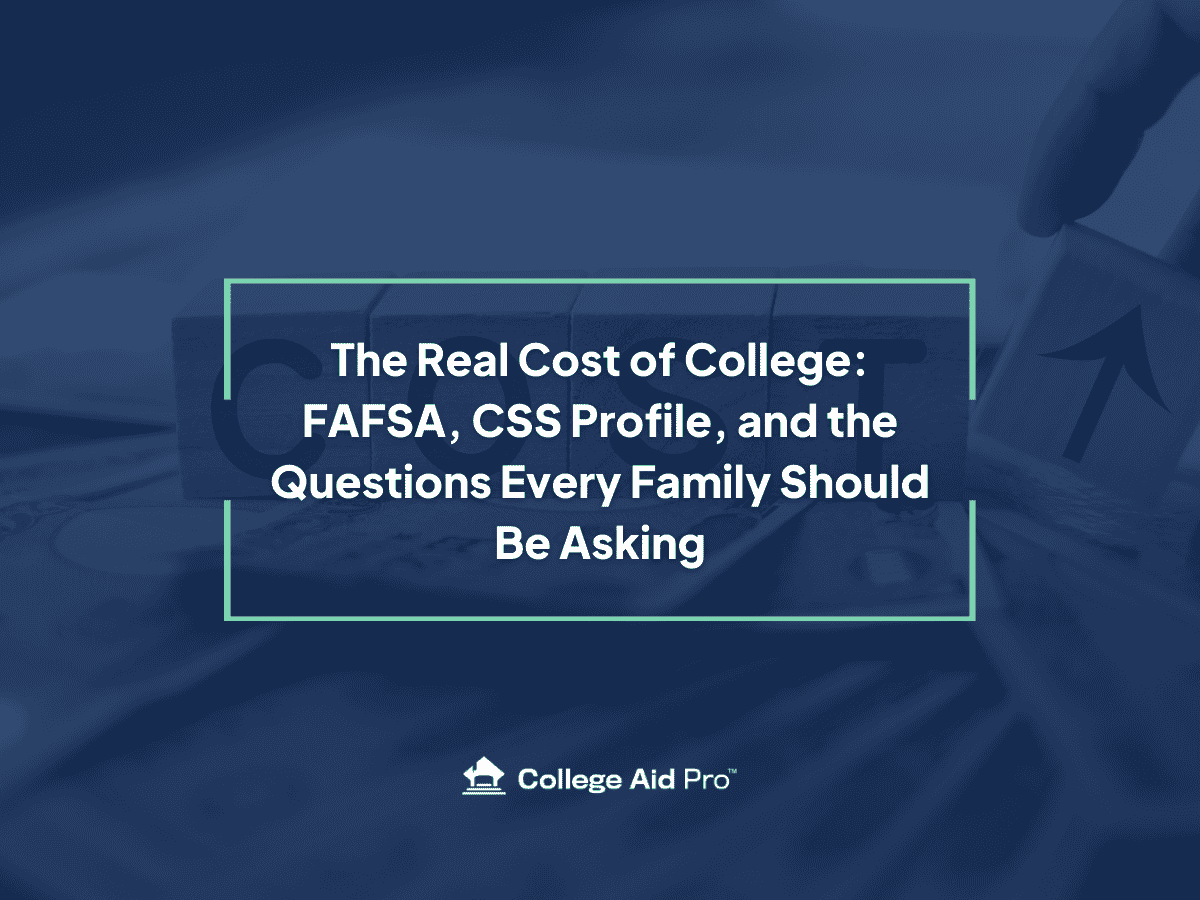How a Department of Education Shutdown Could Disrupt College Admissions, Financial Aid, and Campus Services.
As college-bound families prepare for the critical next steps in their students’ education, a potential shutdown of the Department of Education (DOE) could introduce a

layer of uncertainty and disruption to an already complex process. From admissions delays to changes in key campus services, the DOE plays a crucial role in the functioning of colleges and universities, including aspects that directly affect student enrollment, financial aid, and the day-to-day services students rely on during their academic careers.
At College Aid Pro, we understand that navigating the college admissions process can be a daunting task, and even small disruptions can lead to big challenges for families. The impact of a Department of Education shutdown could affect a variety of aspects of college planning, and being prepared for these disruptions will help ensure your family can weather any uncertainties that come your way. Here’s what you need to know about how this potential shutdown could disrupt college admissions and campus services.
Delays in Admissions Decisions: Uncertainty for College-Bound Students
For most families, the college admissions process is a pivotal moment. The decision about where your child will attend college can have long-lasting implications not only on their academic future but also on your family’s financial plans. If a Department of Education shutdown happens, universities—particularly those dependent on federal funding for research and administrative operations—could face delays in processing admissions applications.
Admissions Delays:
A prolonged government shutdown could impact the ability of colleges to make timely admissions decisions. This could happen due to staffing reductions, a slowdown in processing applications, or the inability to meet usual operational timelines. Families may find themselves in a situation where they don’t know whether their child has been accepted to their desired schools until much later than expected, potentially disrupting their ability to make informed decisions about future plans.
Delayed Scholarship Offers and Financial Aid Packages:
In addition to delays in admissions decisions, a Department of Education shutdown could cause a lag in the disbursement of federal financial aid, including scholarships and grants. For families relying on merit-based or need-based aid to make college more affordable, a delay in the release of these offers could prevent timely financial planning and decision-making. Scholarship offers often come shortly after admissions decisions, and if both are delayed, families may struggle to assess which school is financially viable, leaving them in a holding pattern.
Impact on Application Deadlines:
Many universities may respond to the potential disruption in operations by extending application deadlines, though this can lead to confusion, especially for students and families who have already planned around existing deadlines. The shifting timelines may offer some relief, but they also increase uncertainty, particularly when it comes to managing multiple college applications and related financial obligations.
Changes to Campus Services:
Beyond admissions and financial aid disruptions, a Department of Education shutdown could affect the wide range of services that students depend on once they arrive on campus. These services, funded by the DOE, include everything from academic advising to career counseling and mental health resources. Reduced or delayed federal funding may result in limited availability or outright cuts to these essential campus services.
Academic Advising Delays:
For students navigating course selection, degree requirements, or addressing academic challenges, timely access to academic advisors is vital. However, if funding cuts lead to staff reductions, universities may struggle to provide the comprehensive advising services that students need. Delays in academic advising could hinder students from registering for courses on time, choosing majors, or addressing academic concerns during critical periods, like the start of a new semester.
Career Services Impact:
Career services are crucial for helping students prepare for life after college, from securing internships to building professional networks. Many career services programs rely on federal funding to support partnerships with employers, host career fairs, and provide resources for job placement. A reduction in funding could limit these opportunities, leaving students with fewer avenues to explore internships or career-building events that are essential for their professional development.
Mental Health and Counseling Services:
Mental health support on college campuses has become increasingly vital as students face the pressures of academic life and personal challenges. Many schools rely on federal funding to maintain mental health counseling services. A DOE shutdown could result in longer wait times for counseling sessions or reduced access to essential mental health services. For families, this could raise significant concerns about their child’s well-being, especially during a transitional time like the first year of college.
Student Support and Engagement:
Student engagement programs—ranging from extracurricular activities to leadership development and clubs—are an important part of the college experience. Many of these programs receive federal funding, and cuts could lead to fewer opportunities for students to engage outside the classroom. Families should consider how disruptions to student engagement might affect their child’s overall college experience, particularly for those who rely on these programs to build connections, grow personally, and enhance their social networks.
Want to Hear More → Listen to the Full Episode on Our Podcast
How Can College-Bound Families Prepare for Potential Disruptions of a Department of Education Shutdown?
At College Aid Pro, we are your trusted experts in college planning, providing the latest insights and updates on Department of Education policies, financial aid regulations, and any legislative changes that could impact your family’s financial future. With topics like the potential taxation of scholarships, it’s clear that shifts in the law can have a significant effect on your college funding strategy. Staying informed is essential to making proactive, well-informed decisions. That’s why we are dedicated to offering the most current and reliable information to guide you. To keep yourself up to date, be sure to follow our blog, engage with us on social media, and tune into our podcast. By staying connected with College Aid Pro, you’ll always have expert advice at your fingertips, helping you confidently navigate any changes in the financial aid landscape.
Stay in Communication with Colleges:
It’s essential to maintain open lines of communication with the colleges your child is applying to or where they have been accepted. Reach out to the admissions and financial aid offices to inquire about potential delays in admissions decisions or changes in the timing of financial aid packages. Many universities are likely to have contingency plans in place to address any disruptions caused by a Department of Education shutdown, and staying informed will help you adjust your expectations accordingly.
Have Backup Plans for Scholarships and Aid:
While federal scholarships and financial aid are critical components of college funding, it’s wise to explore additional funding options. Look into private scholarships, institutional grants, and state-based aid programs that may be unaffected by the Department of Education shutdown. These alternative sources of funding can help fill the gap if federal financial aid packages are delayed or reduced.
Consider Flexibility in College Plans:
Given the possibility of extended deadlines or changes to the admissions process, flexibility is key. Be prepared for the reality that some schools may adjust their timelines. Having a flexible approach to your child’s application process and deadlines will make it easier to adapt if things don’t go according to plan.
Research Campus Services:
If your child will be relying on critical campus services like academic advising, career counseling, or mental health support, it’s important to understand how a Department of Education shutdown could impact the availability of these services. Contact the college’s student support offices to ask about potential changes or delays in service availability. This will allow you to plan for contingencies and seek out alternative resources if necessary.
Create a Contingency Budget:
As part of your overall financial planning, it’s a good idea to create a contingency budget. Consider the possibility of delays in financial aid disbursement, tuition payment deadlines, or additional expenses related to a lack of campus services. A flexible budget will help your family adapt to any unexpected costs and ensure that you can cover any gaps during times of uncertainty.
Conclusion: Navigating the Uncertainty of College Admissions and Campus Services
A potential Department of Education shutdown introduces a significant level of uncertainty to the college admissions process, financial aid timelines, and the availability of essential campus services. At College Aid Pro, we understand the complexities families face during this transitional time. That’s why we’re committed to providing expert guidance, resources, and tools to help families navigate the potential challenges of a government shutdown.
By staying informed, maintaining open communication with colleges, exploring backup funding options, and preparing financially, families can ensure that their child’s college journey remains on track, even in the face of uncertainty. College Aid Pro is here to help you make the best decisions for your family, no matter what challenges arise. With the right preparation and support, you can confidently navigate the admissions process and provide your child with the resources they need to succeed in college.



